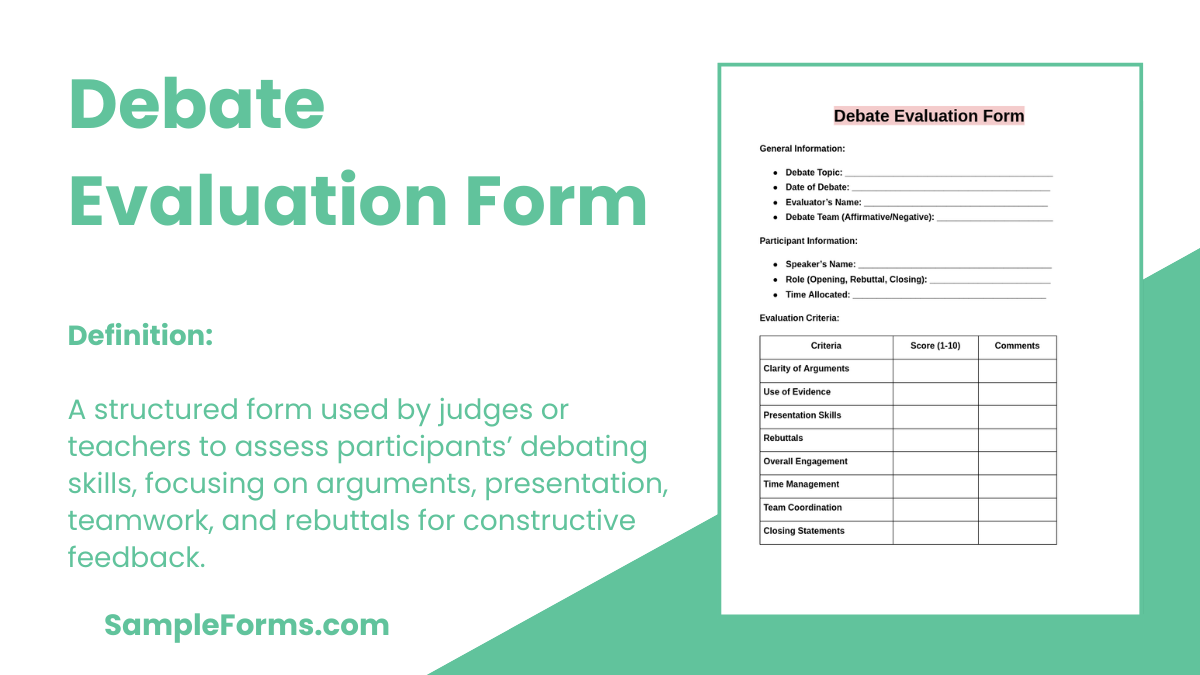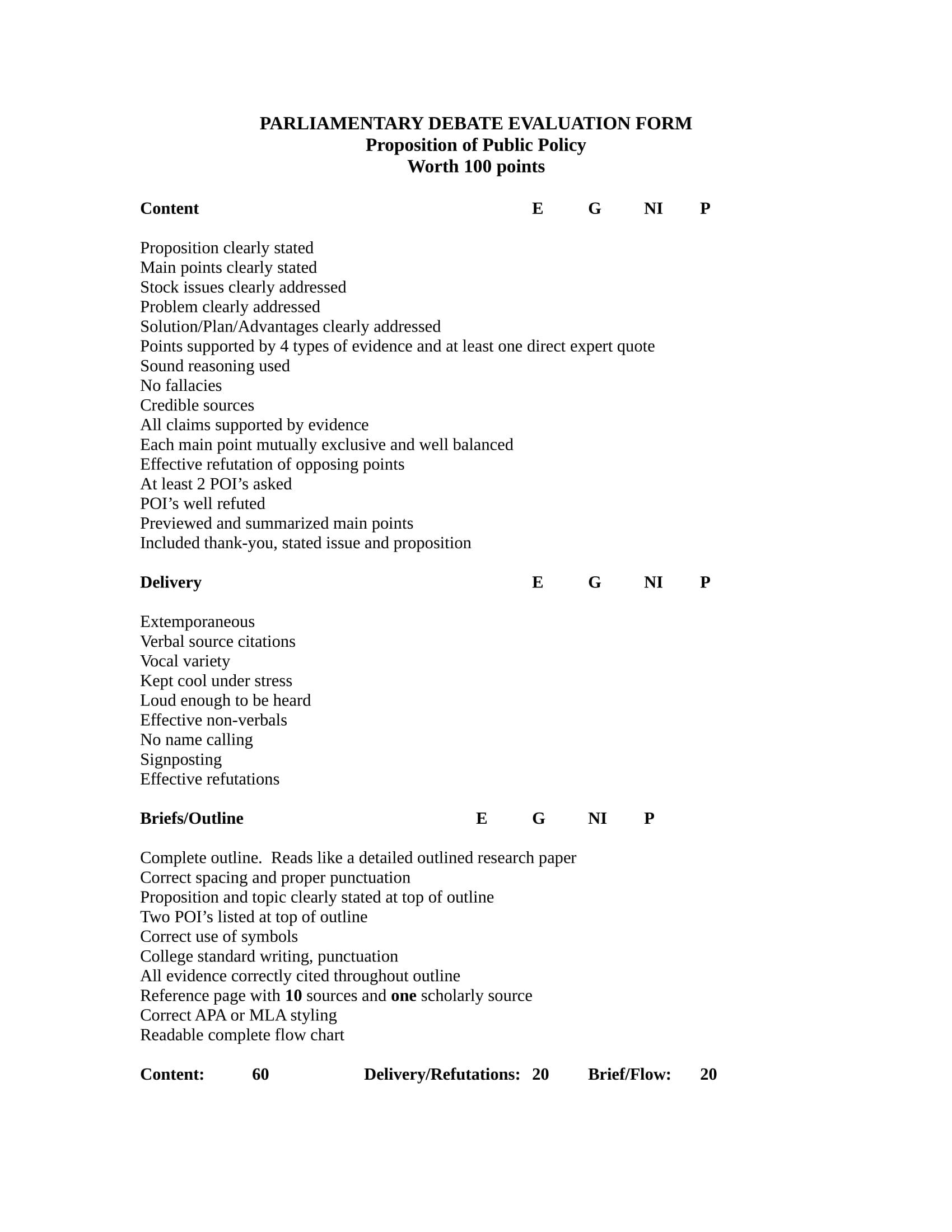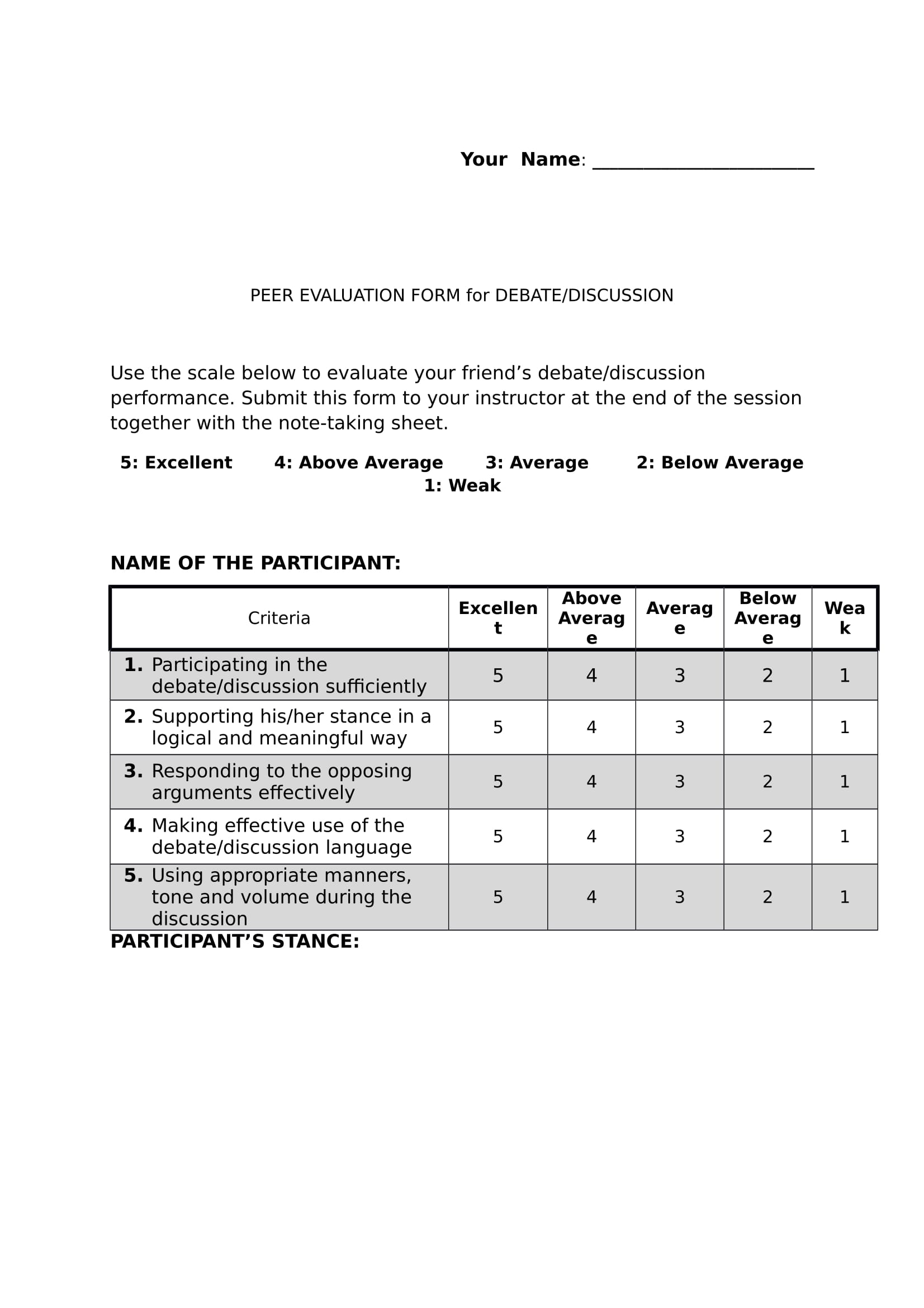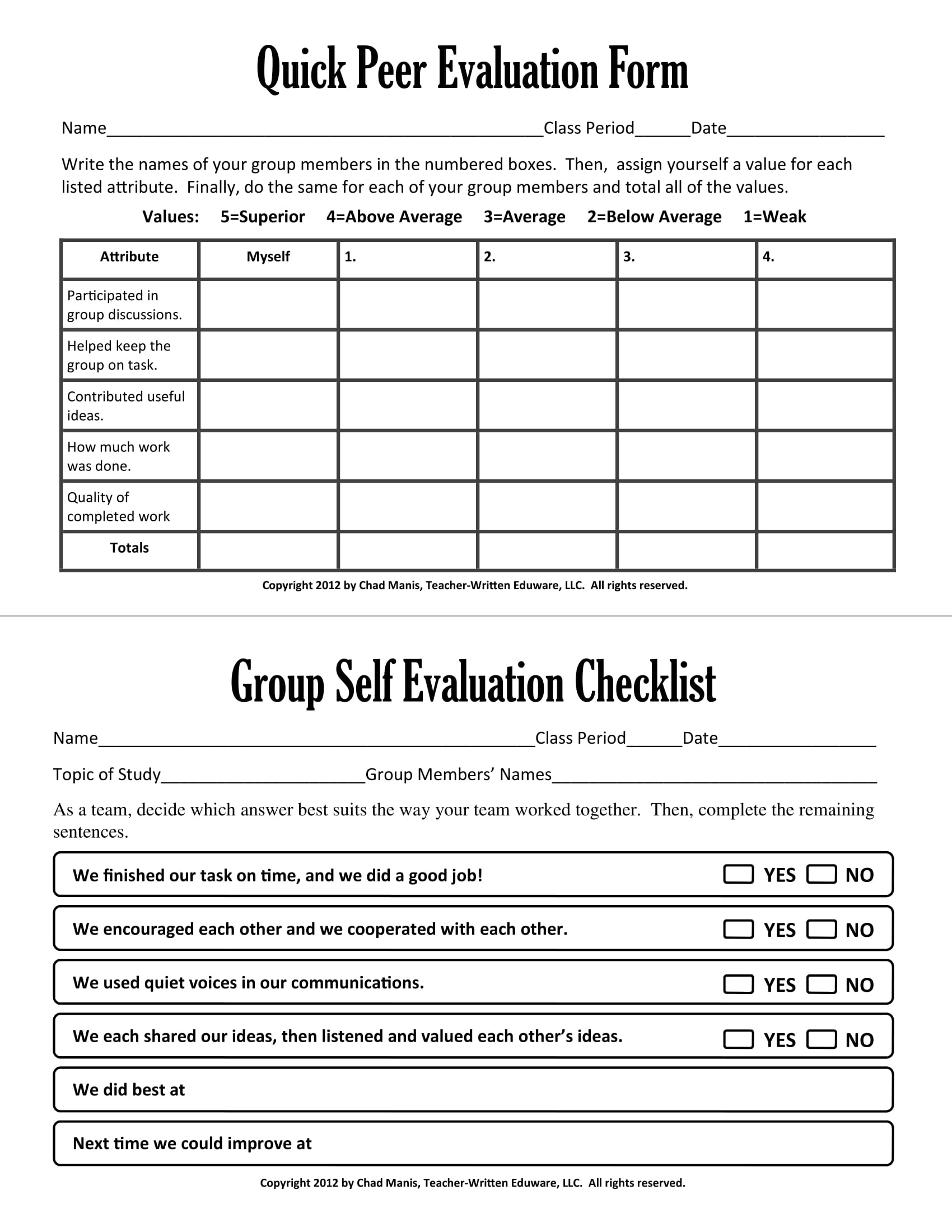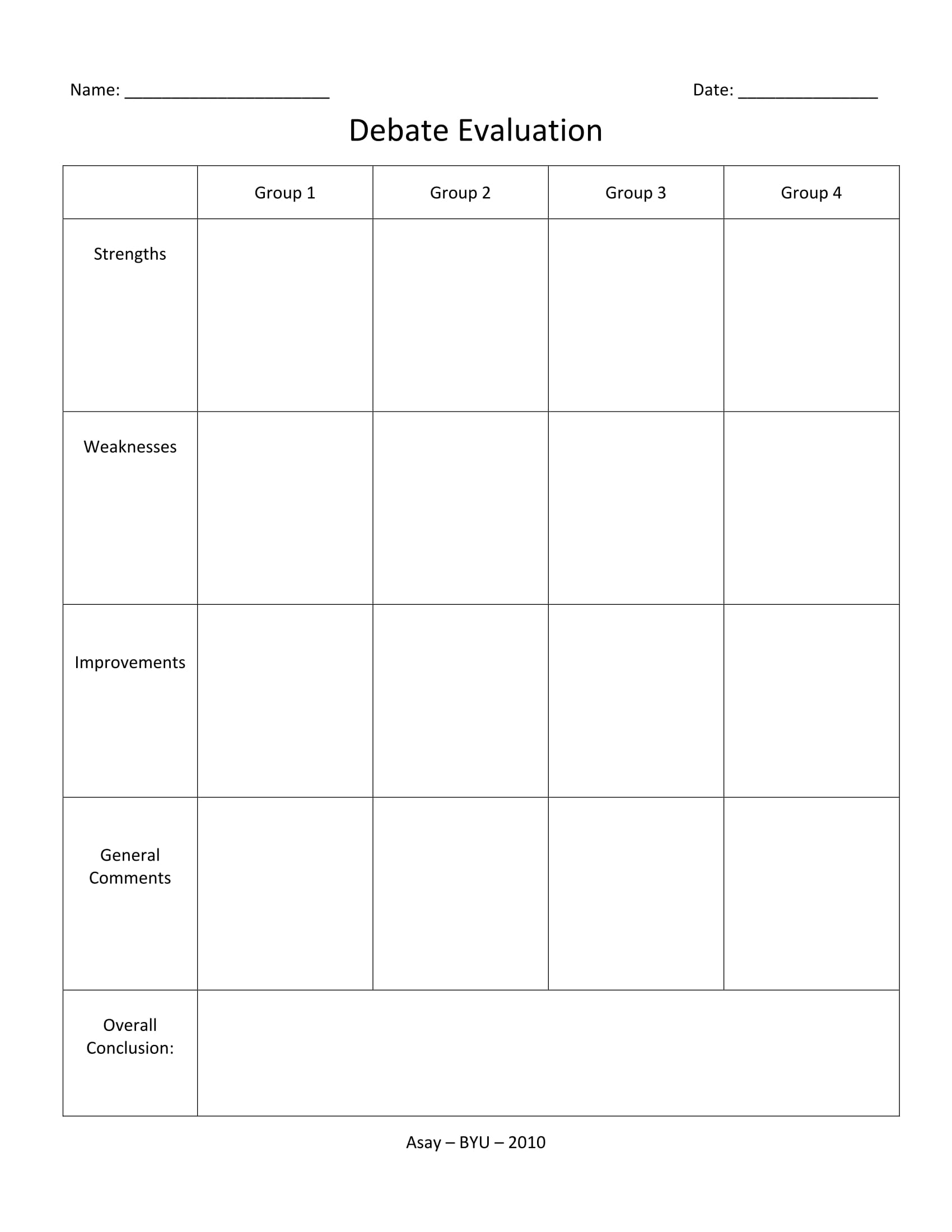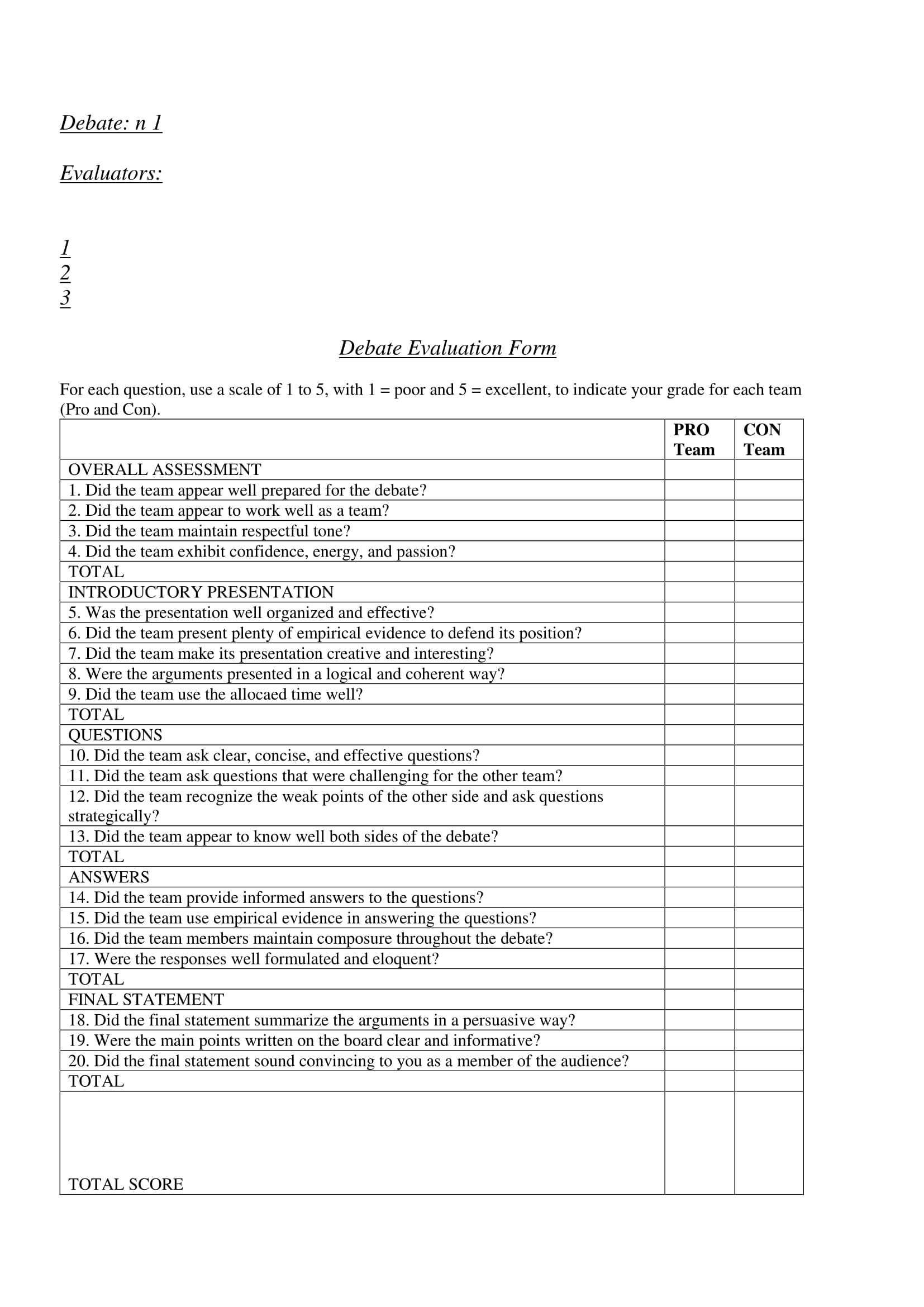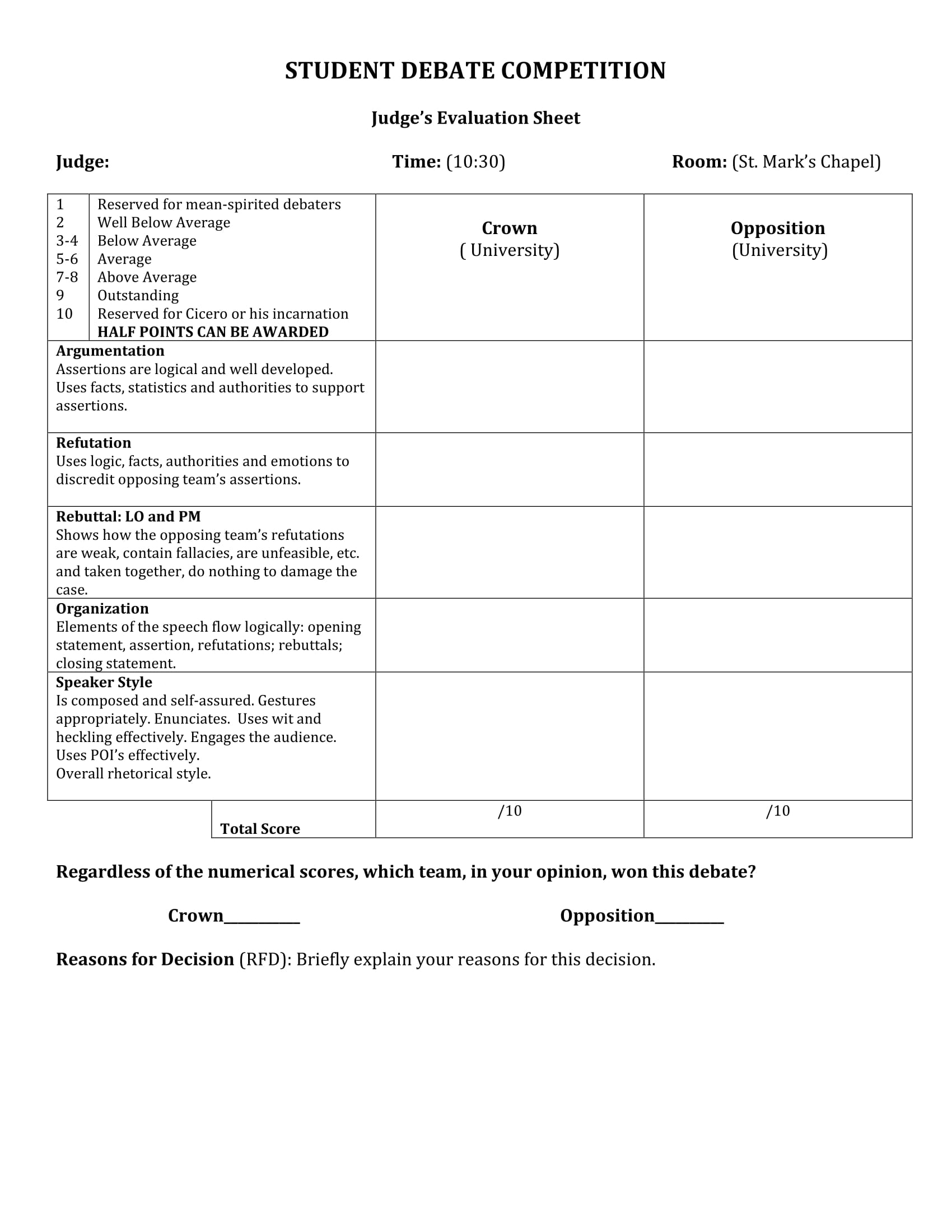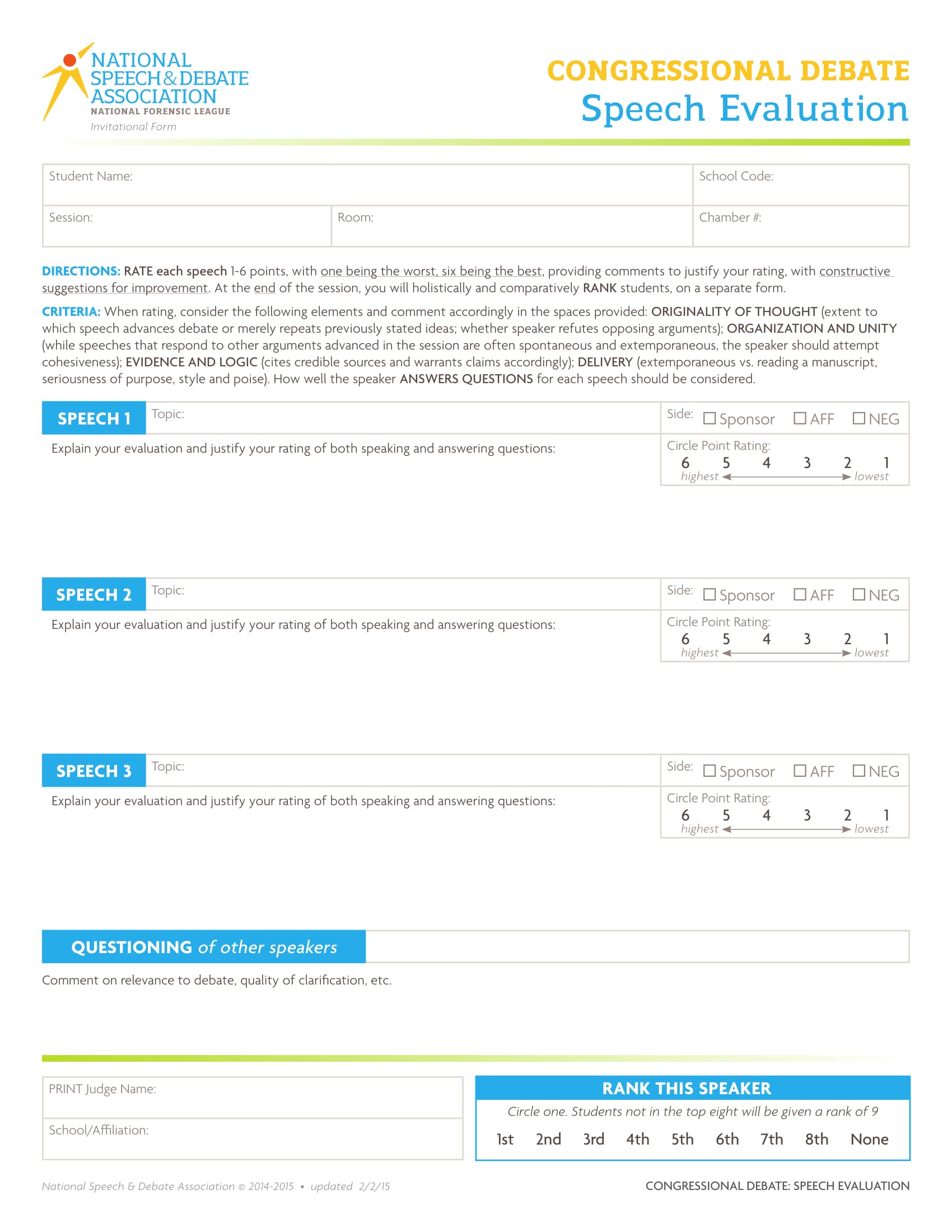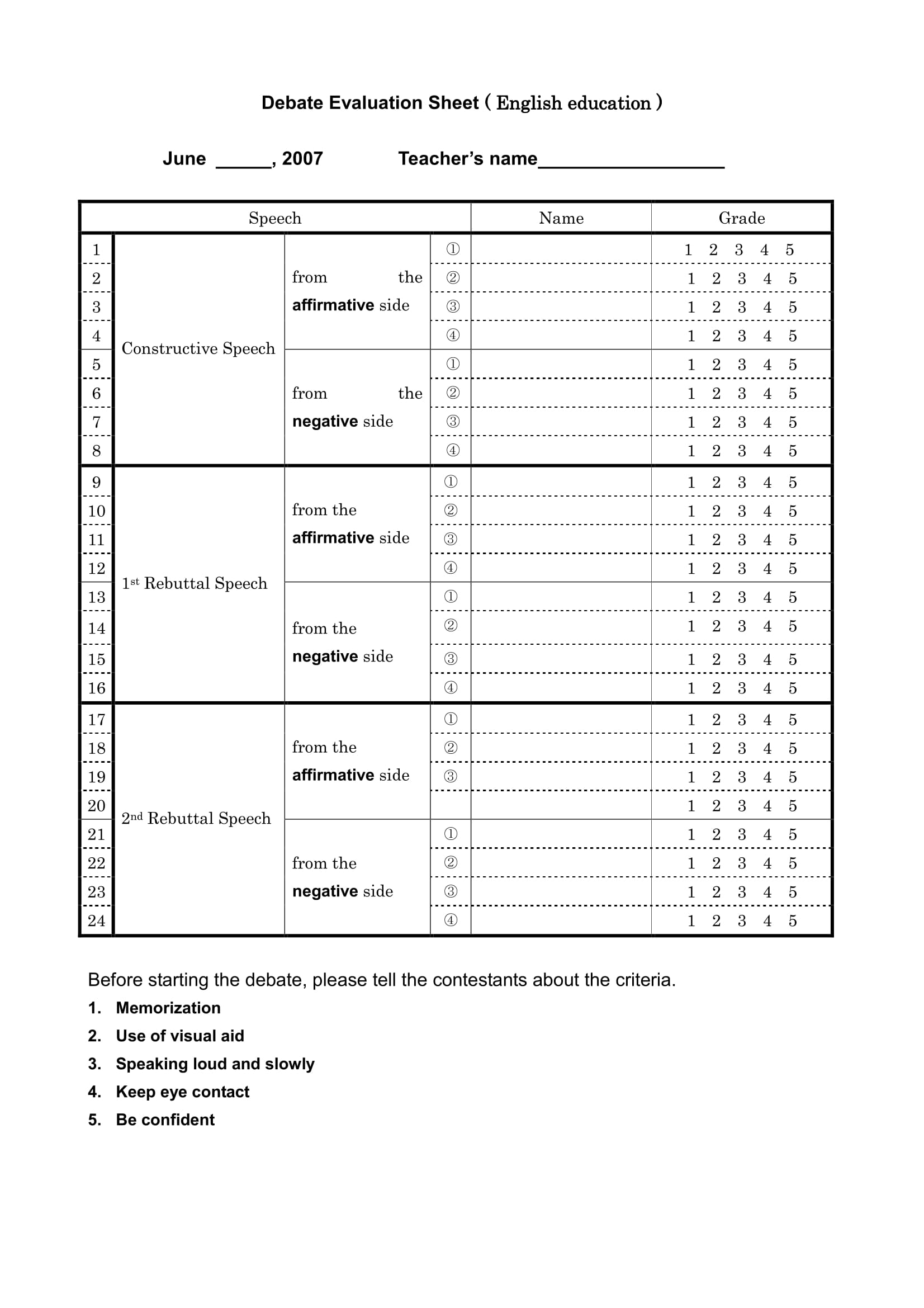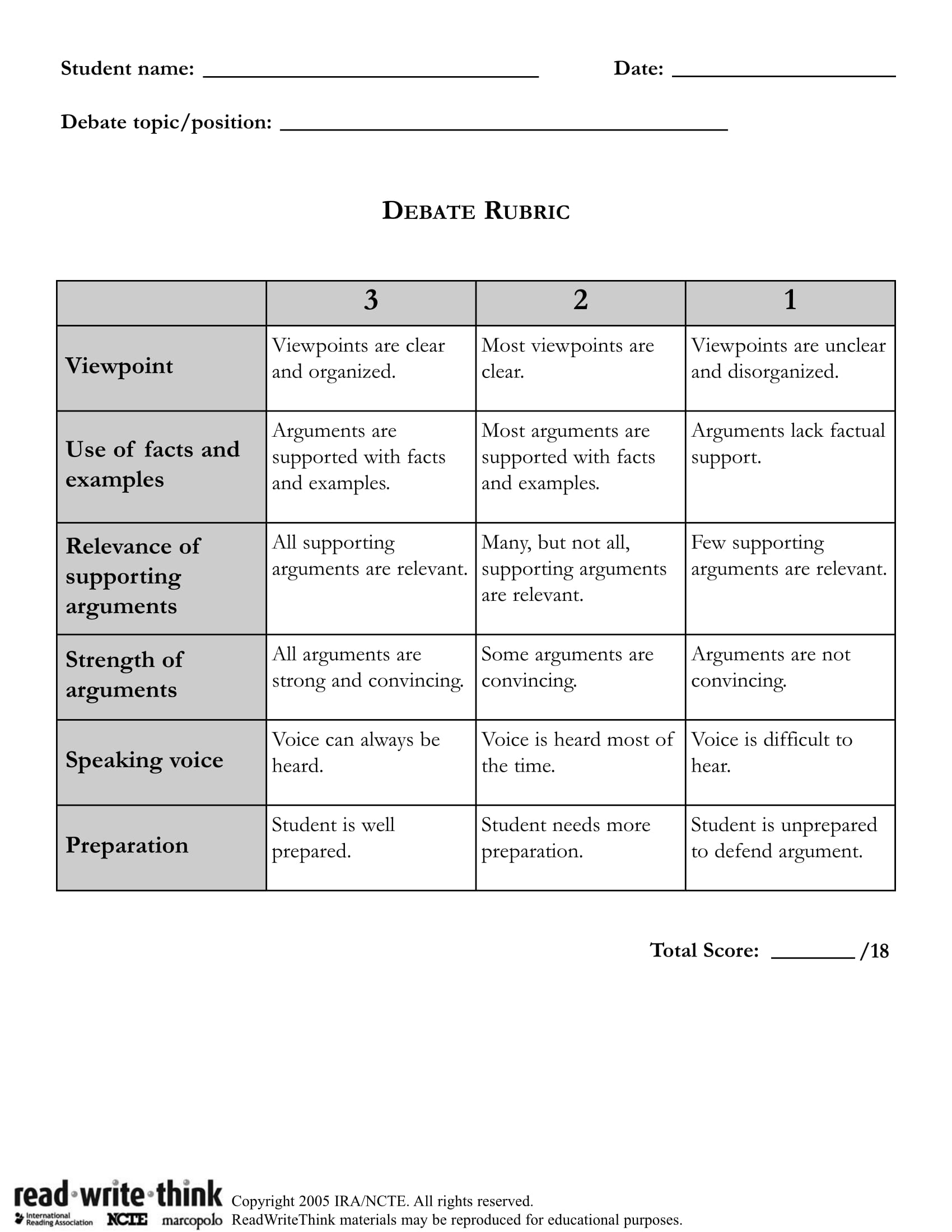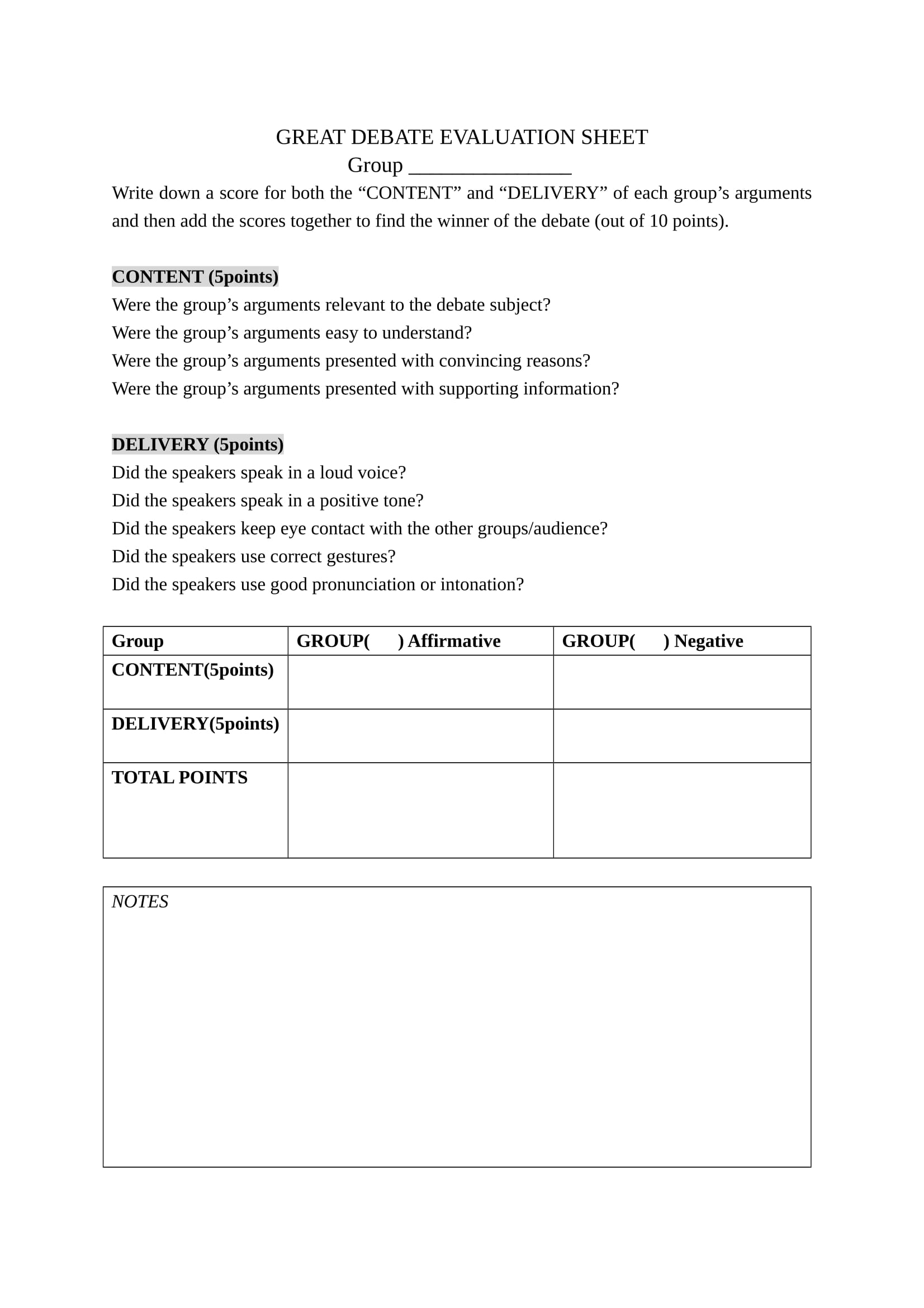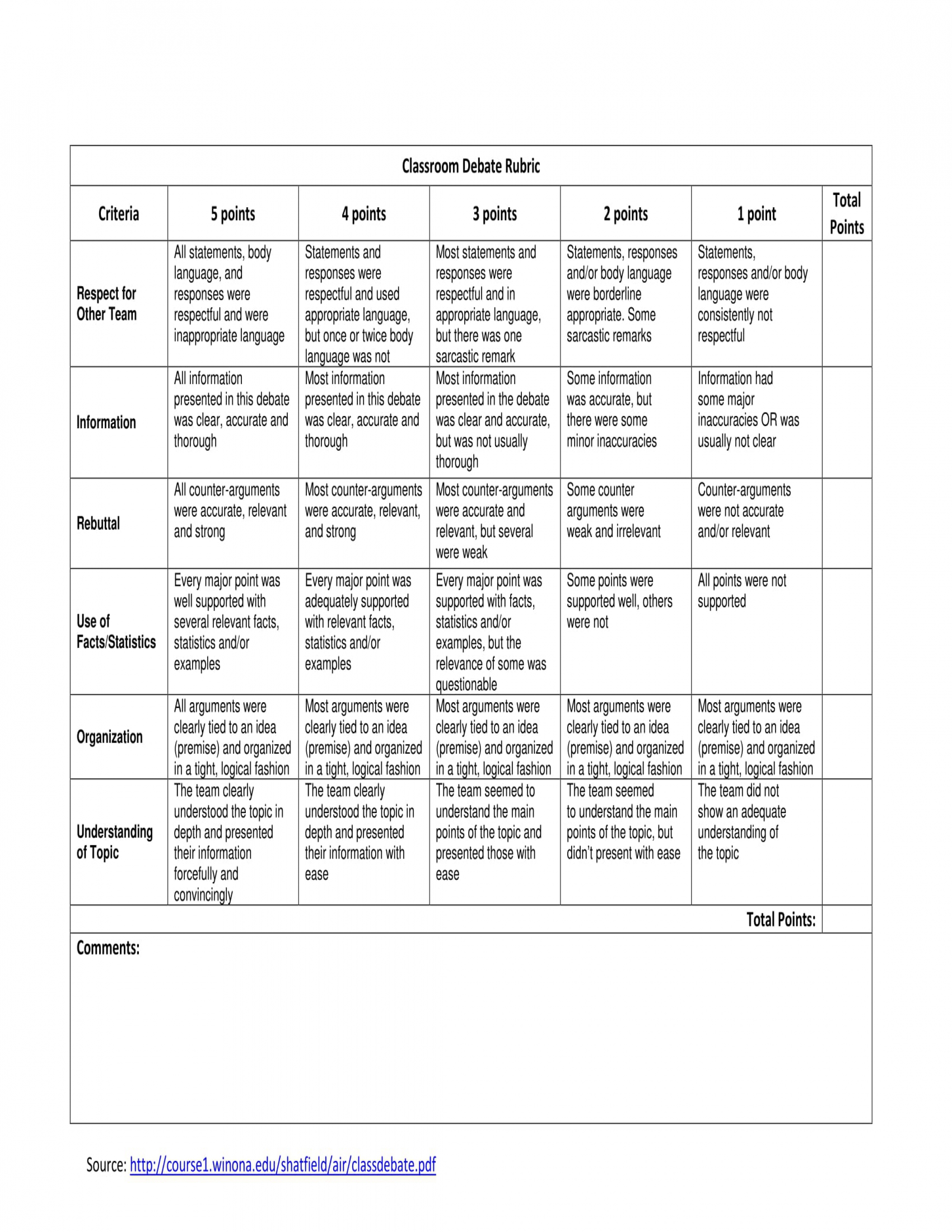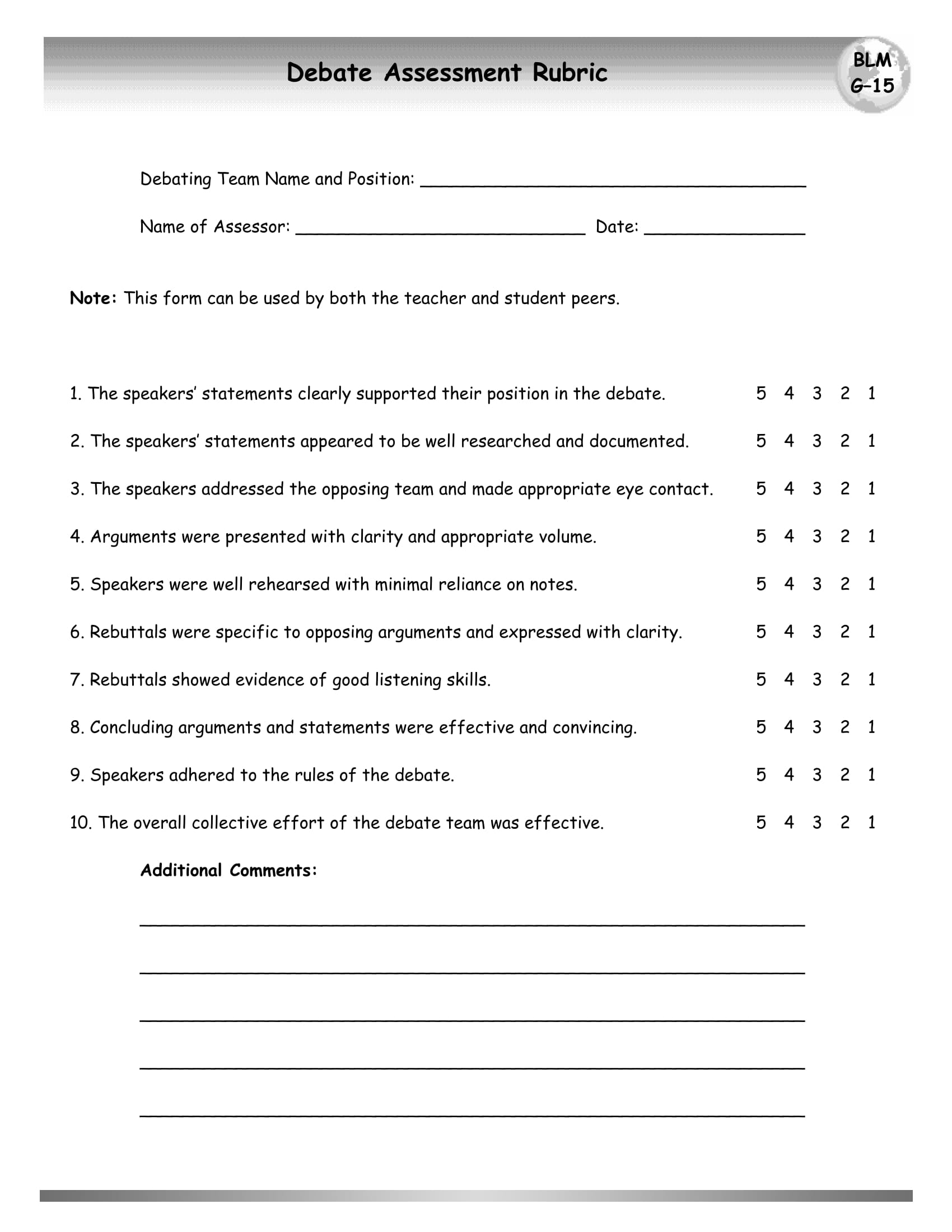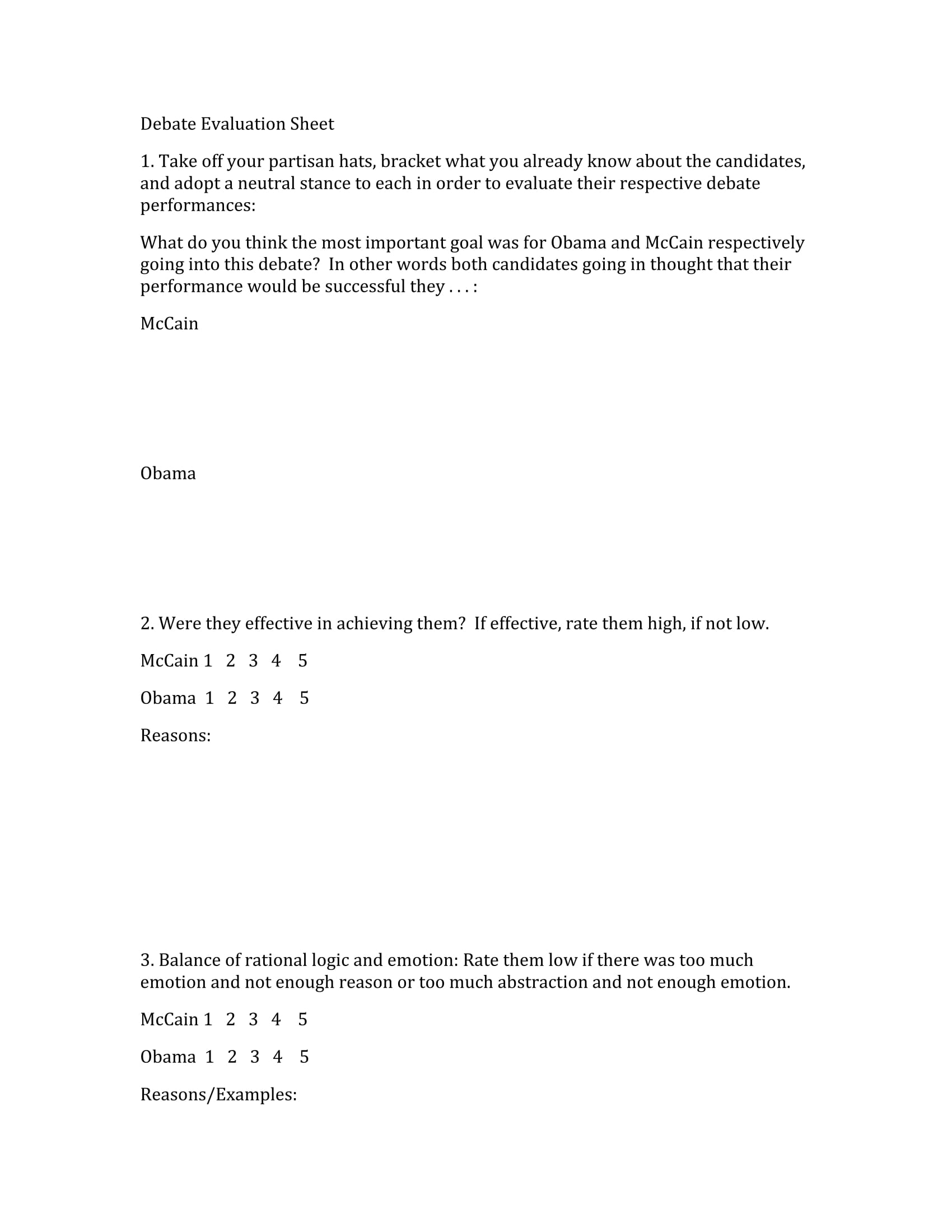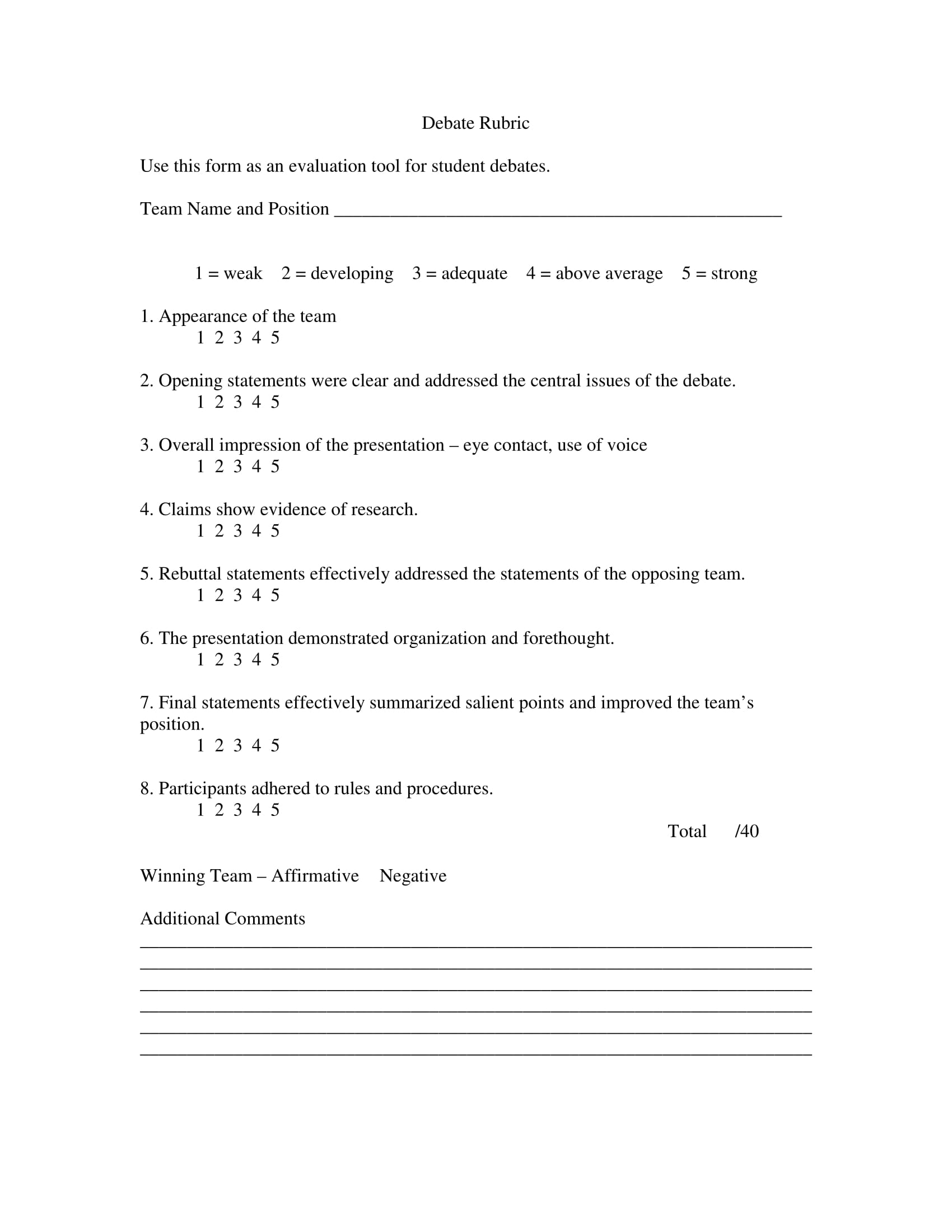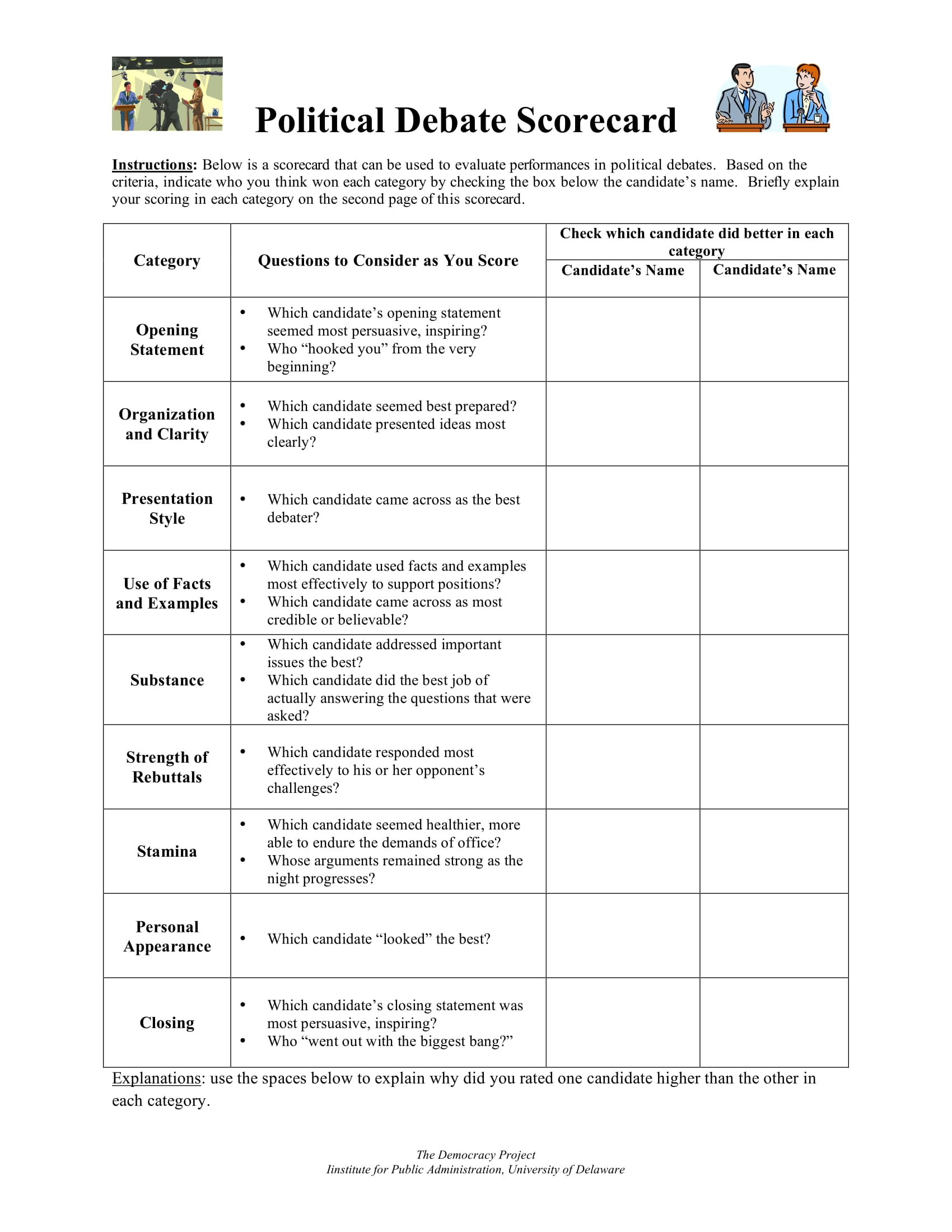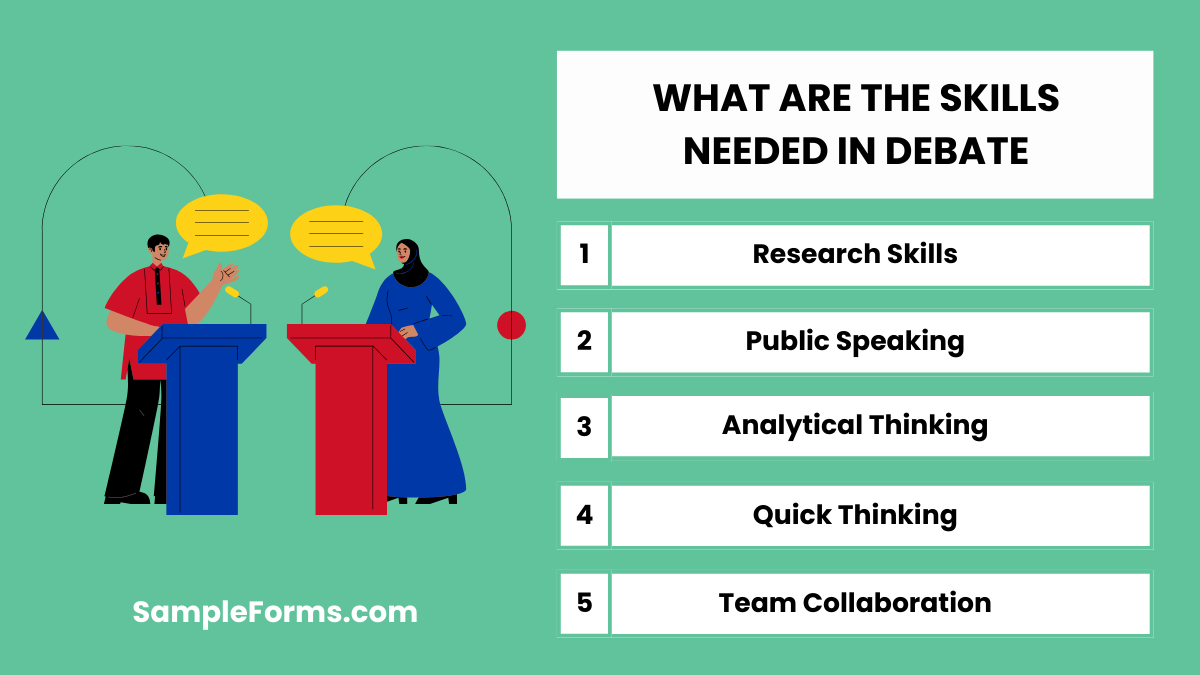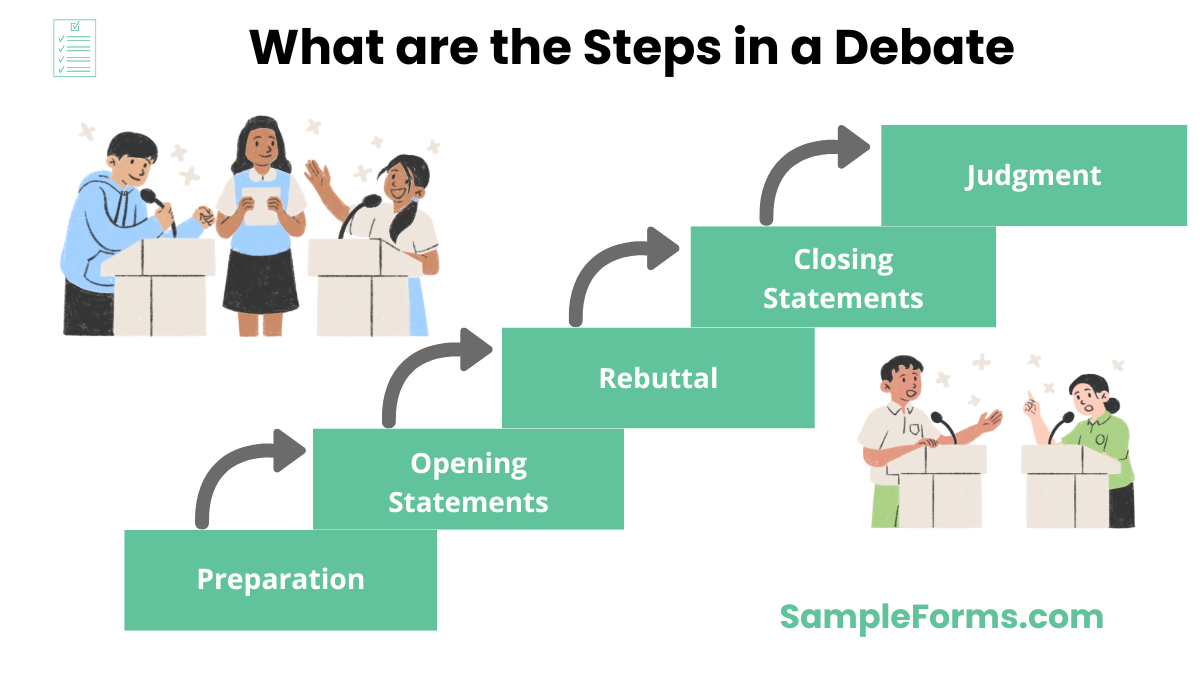The Debate Evaluation Form is an essential tool for assessing debate performances. It provides a structured way to give constructive feedback and highlights areas for improvement. This form helps evaluators focus on critical aspects like argument strength, delivery, and teamwork. Using an Evaluation Form ensures consistency and clarity in scoring, just like a Presentation Evaluation Form used in academic or corporate settings to refine speaking skills.
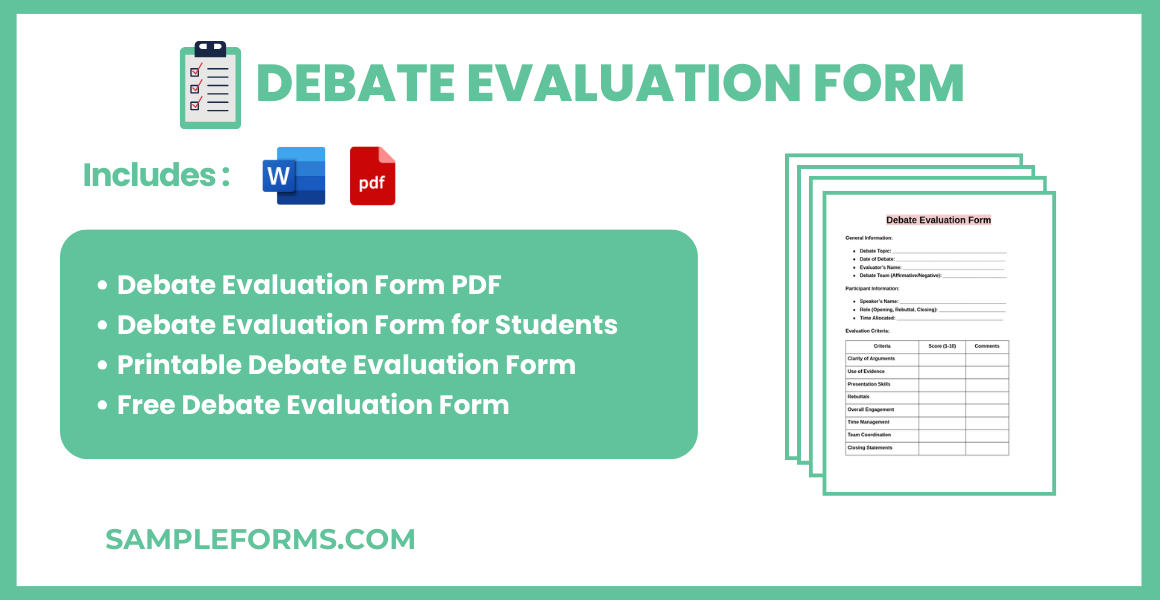
Download Debate Evaluation Form Bundle
What is Debate Evaluation Form?
A Debate Evaluation Form is a document used to assess participants’ debate skills. It evaluates elements like argument logic, evidence, speaking clarity, and engagement. By focusing on structured criteria, evaluators provide objective feedback, fostering skill development in debating.
Debate Evaluation Format
Event Details:
- Debate Topic:
(State the topic of the debate) - Date of Debate:
(Enter the event date) - Judge’s Name:
(Full name of the evaluating judge)
Participant Evaluation Criteria:
- Argument Clarity:
(Score and comments) - Rebuttal Effectiveness:
(Score and feedback) - Engagement with Audience:
(Score based on interaction) - Time Management:
(Evaluate adherence to time limits)
Final Feedback:
Provide recommendations for improvement:
- Key Strengths:
(Highlight participant’s strengths) - Areas for Development:
(List specific suggestions)
Judge’s Signature:
Date:
Debate Evaluation Form PDF
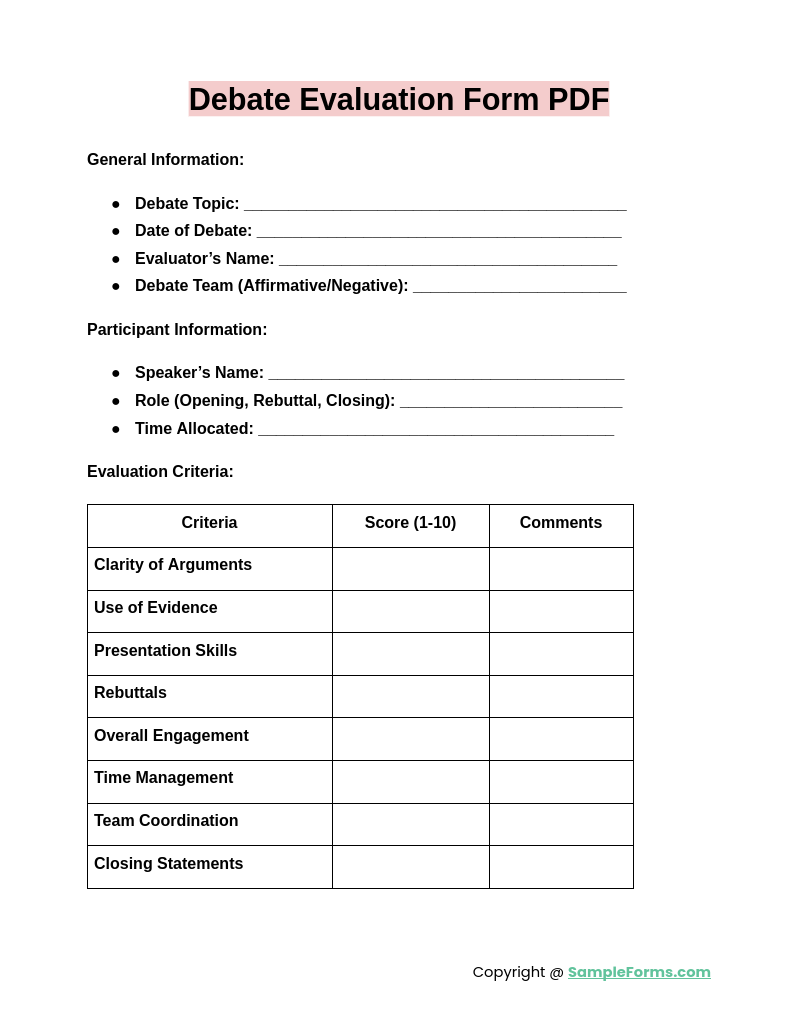
The Debate Evaluation Form PDF offers a standardized way to evaluate debate performances digitally. It provides structured criteria, ensuring consistency in assessing argument quality, delivery, and teamwork. It’s similar to an Employee Evaluation Form that assesses workplace performance.
Debate Evaluation Form for Students
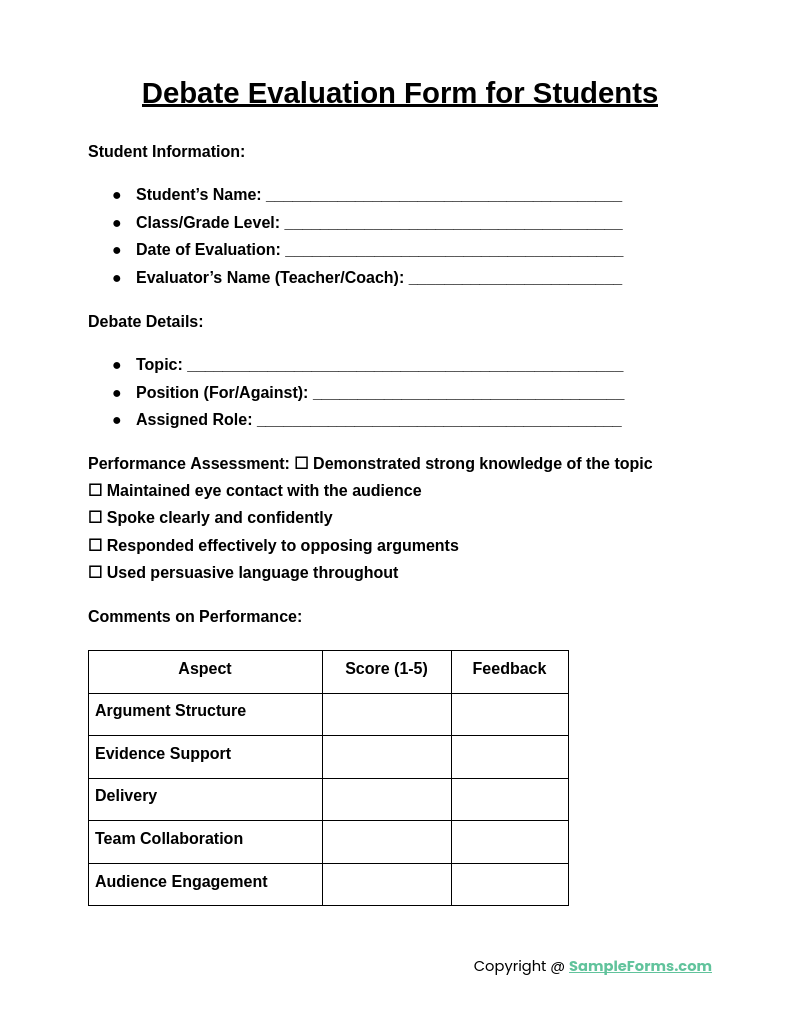
The Debate Evaluation Form for Students is a tailored tool designed to help educators assess students’ debating skills. It focuses on critical areas like argument structure, rebuttal skills, and speaking clarity, similar to a Training Evaluation Form that tracks skill development.
Printable Debate Evaluation Form
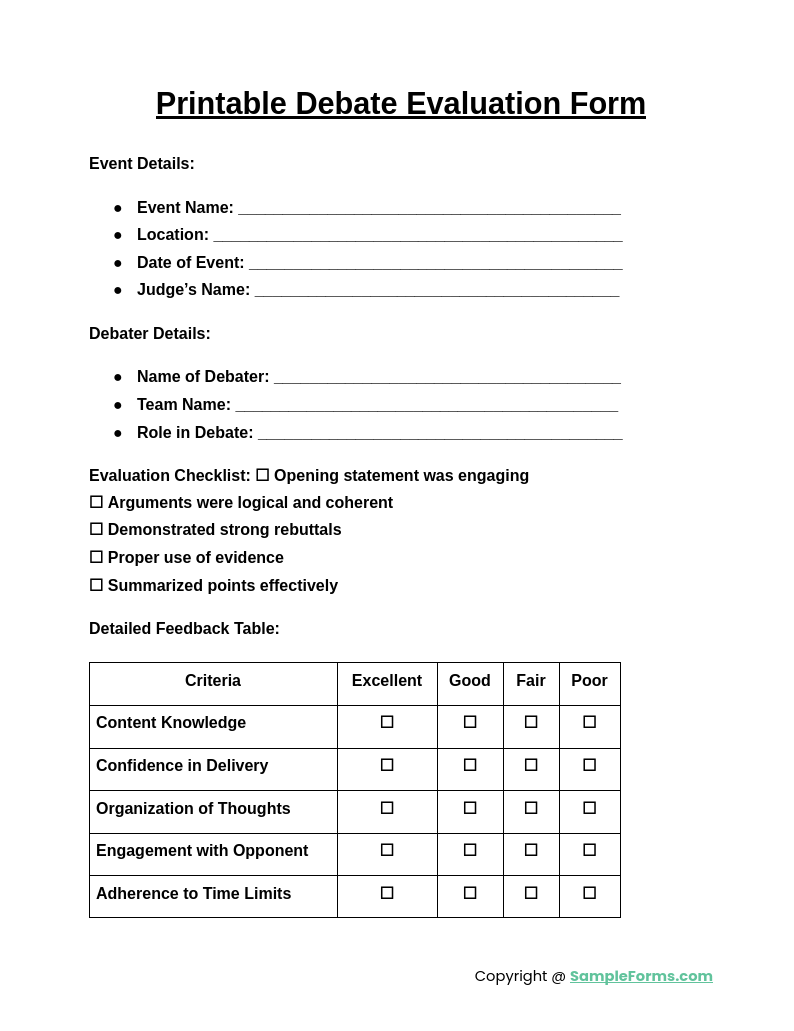
A Printable Debate Evaluation Form is perfect for offline use, allowing evaluators to conveniently rate debate participants’ performance. It serves a similar role as an Employee Self Evaluation Form but focuses on assessing communication skills and critical thinking.
Free Debate Evaluation Form
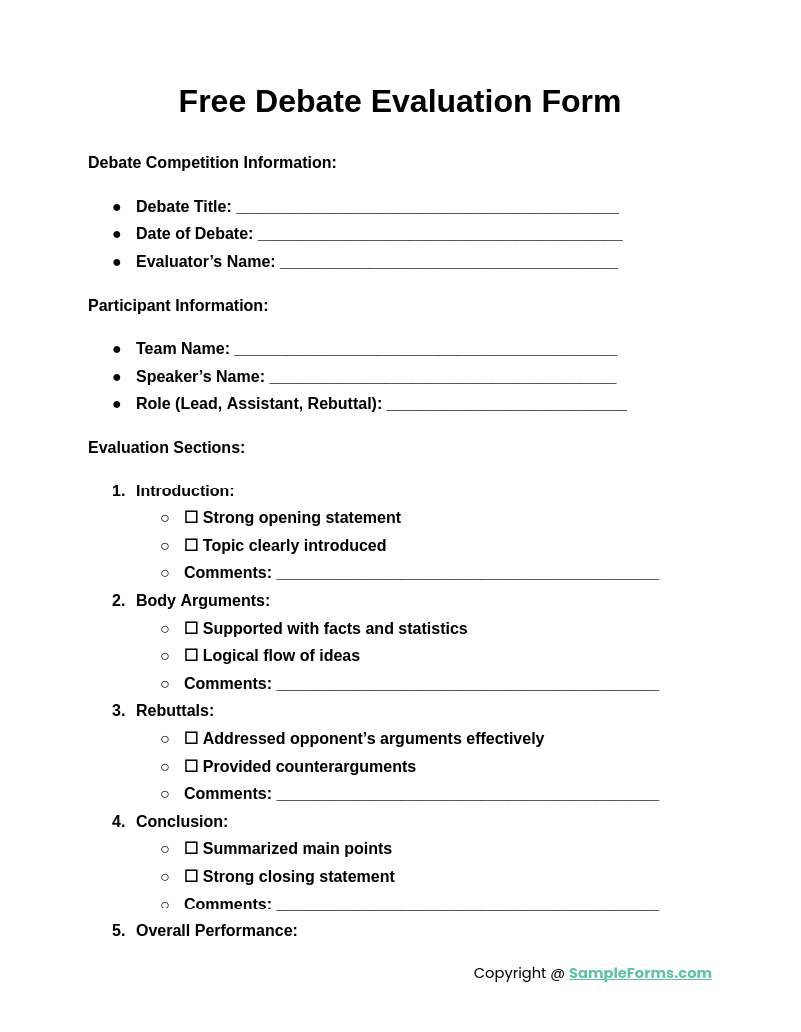
The Free Debate Evaluation Form is an easily accessible tool designed to evaluate debate sessions without any cost. It aids in providing objective feedback, much like a Peer Evaluation Form used to assess team contributions in collaborative projects.
Browse More Debate Evaluation Forms
Parliamentary Debate Evaluation Form
Peer Debate Evaluation Form
Quick Peer Debate Evaluation Form
Situation Debate Evaluation Form
Team Debate Evaluation Form
Debate Judge Evaluation Sheet Form
Debate Speech Evaluation Form
Education Debate Evaluation Form
General Debate Evaluation Form
Group Debate Evaluation Form
Classroom Debate Evaluation Form
Debate Assessment Evaluation Form
Debate Candidate Evaluation Form
Debate Evaluation Form Sample
Debate Evaluation Scorecard Form
What are the skills needed in debate?
Skills required in debate include critical thinking, public speaking, and active listening. Similar to a Bid Evaluation Form, assessing these skills helps improve delivery.
- Research Skills: Gathering credible information.
- Public Speaking: Confident and clear speech.
- Analytical Thinking: Breaking down arguments logically.
- Quick Thinking: Responding to rebuttals.
- Team Collaboration: Working effectively in group debates.
How do you evaluate a debate?
Evaluating a debate requires assessing argument structure, evidence, rebuttals, and presentation style. It’s similar to a Call Monitoring Evaluation Form used to assess communication effectiveness.
- Content Quality: Focus on evidence-based arguments.
- Rebuttal Strength: Effectiveness of countering opponents’ points.
- Speaking Style: Clarity, tone, and fluency.
- Time Management: Proper utilization of allotted time.
- Engagement: Interaction with the audience and judges.
What are the criteria for assessing debate?
Criteria for debate assessment include clarity, logic, evidence, and rebuttal effectiveness. This evaluation mirrors an Interview Evaluation Form where structured feedback is essential.
- Clarity of Arguments: Ensuring ideas are presented clearly.
- Logical Flow: Coherent progression of points.
- Supporting Evidence: Use of facts and data.
- Counterarguments: Handling opposing viewpoints.
- Body Language: Non-verbal cues impact scoring.
What are the Steps in a debate?
Debating involves preparation, argument presentation, rebuttal, closing statements, and assessment. It’s akin to a Food Sensory Evaluation Form where each stage contributes to the final score.
- Preparation: Research and organize arguments.
- Opening Statements: Present main arguments.
- Rebuttal: Address opposing views.
- Closing Statements: Summarize key points.
- Judgment: Based on criteria like evidence and delivery.
How do you analyze a debate?
Analyzing a debate involves evaluating content, structure, and presentation to identify strengths and areas for improvement. Similar to a Speech Evaluation Form, feedback is crucial for growth.
- Content Review: Check for evidence-backed claims.
- Argument Flow: Analyze the logic of points made.
- Speaker Effectiveness: Assess tone, pace, and delivery.
- Rebuttal Efficiency: How well counterarguments were addressed.
- Overall Impact: Audience and judge engagement.
What are the rubrics for debate?
Rubrics for debate include clarity, content, rebuttals, and delivery. Like an Internship Evaluation Form, it measures performance based on set criteria to ensure fair assessment.
How to score a debate competition?
Debate scoring involves evaluating arguments, rebuttals, and presentation. Similar to a Food Evaluation Form, it uses a structured method to judge participants’ effectiveness.
How do you evaluate someone’s argument?
Evaluate an argument by analyzing evidence, coherence, and logic, much like assessing a Course Evaluation Form to ensure all elements meet expected standards.
How do you structure debate points?
Structure debate points with clear introductions, supporting evidence, and concise conclusions. This organization mirrors a Mentor Evaluation Form where clarity and impact are key.
How to critically assess an argument?
Critically assess arguments by examining evidence, identifying logical fallacies, and evaluating counterpoints. This is akin to a Mentee Evaluation Form, focusing on strengths and improvement areas.
What makes a strong debater?
A strong debater uses logical arguments, confident speech, and effective rebuttals, akin to skills measured in a Sensory Evaluation Form for thorough assessment.
What are the basic rules of a debate?
Debate rules include presenting clear arguments, following time limits, and respectful rebuttals, much like guidelines in an Employee Performance Evaluation Form.
How to make a debate more interesting?
Make debates engaging by incorporating diverse topics, active participation, and dynamic speakers, similar to enhancing engagement in a Driver Evaluation Form.
What are the main parts of a debate?
A debate has an introduction, argument presentation, rebuttal, and conclusion, much like sections in a Sales Evaluation Form that assess effectiveness.
How to judge a debate performance?
Judging debate involves evaluating arguments, delivery, and rebuttals, similar to using a Candidate Evaluation Form to score based on predefined criteria.
The Debate Evaluation Form use is a practical resource for teachers, coaches, and debate enthusiasts. It ensures comprehensive evaluation, improving debate strategies and presentation skills. Whether for educational or professional use, this form guarantees a fair assessment to enhance communication skills.
Related Posts
-
FREE 6+ Business Credit Checklist Forms in PDF
-
Employee Pay Increase Form
-
Chef Evaluation Form
-
FREE 8+ Kitchen Evaluation Forms in PDF | MS Word
-
Customer Service Evaluation Form
-
FREE 15+ Grant Evaluation Forms in PDF | MS Word
-
FREE 14+ Volunteer Evaluation Forms in PDF
-
Mentee Evaluation Form
-
Speaker Evaluation Form
-
FREE 14+ Vehicle Evaluation Forms in PDF
-
FREE 14+ Trainee Evaluation Forms in MS Word | PDF
-
Resume Evaluation Form
-
FREE 14+ Retreat Evaluation Forms in PDF
-
FREE 14+ Book Evaluation Forms in PDF | MS Word
-
Food Evaluation Form
